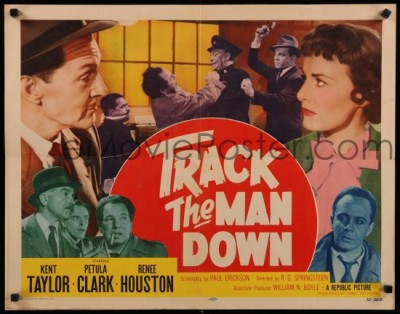| Reviews & Columns |
|
Reviews DVD TV on DVD Blu-ray 4K UHD International DVDs In Theaters Reviews by Studio Video Games Features Collector Series DVDs Easter Egg Database Interviews DVD Talk Radio Feature Articles Columns Anime Talk DVD Savant Horror DVDs The M.O.D. Squad Art House HD Talk Silent DVD
|
DVD Talk Forum |
|
|
| Resources |
|
DVD Price Search Customer Service #'s RCE Info Links |
|
Columns
|
|
|
Track the Man Down
Olive Films' Blu-ray, licensed through Paramount, offers a handsome transfer of this largely forgotten movie.
It starts out well enough, with apparently American gangster Rick Lambert (Oxfordshire-born George Rose), safecracker Ken Orwell (Kenneth Griffith), and muscle Ahmed Jones (Michael Balfour) staging a daring robbery at a London greyhound racetrack in the middle of a race, its stadium crammed with spectators (20-year-old stock footage). Lambert accidentally kills a guard during their getaway.
German Austin Melford (Walter Rilla) masterminded the caper, but Lambert plans to sneak out of the country to Portugal with all the dough, as well as new girlfriend Mary Dennis (Ursula Howells), who turns a blind eye to his obviously criminal activities. Kid sister June (Petula Clark) vainly tries to talk Mary out of that relationship.
Meanwhile, there's an American reporter, John Ford, played by Kent Taylor. The Turner Classic Movies Database identifies his character as Don Ford and, sorry, I don't recall which is correct. Hired under protest because his aunt owns the newspaper, John or Don is assigned to track the movements of stage star Pat Sherwood (Renée Houston), who's accompanied by her long-suffering agent, Gerry Palmer (Charles Lloyd Pack). Most of these characters eventually end up aboard a bus from Victoria's Coach Station to Southhampton. June and Ford are in possession of the satchel containing the stolen money, while Lambert and Orwell nervously look for an opportunity to snatch it back.
Track the Man Down isn't much. No attempt is made to add new wrinkles to these stock situations and, possibly owing to U.S. Production Code and British Board of Film Censors-imposed restrictions, there's a dearth of violence or even much threat of violence. (Or, as reader Sergei Hasenecz suggests, it may simply be "a case of going with a bad script just to use up money held in the UK.") When Melford, sensing Lambert has made off with the money, turns up at Mary's flat, she tells him what he needs to know and Melford, satisfied, simply leaves. He then heads to the pawnshop of a fence, Luis Remino (Richard Molinas), who is helping Lambert flee the country. Remino likewise tells Melford what he wants to know with a minimum of fuss, and Melford lets him off, too, without so much as a slap on the wrist. Tennis, anyone?
Interestingly, the same year Petula Clark made Track the Man Down, she co-starred in the similarly plotted The Runaway Bus (1954), directed by Val Guest and starring Frankie Howerd. That film is a lot more suspenseful, and it's a comedy.
Kent Taylor was primarily a B-movie actor of the ‘30s and ‘40s who traded on his slight resemblance to Clark Gable. (Superman's alter-ego, Clark Kent, was an acknowledged combination of their names.) Taylor was likeable enough but lacked a strong screen presence. After Track the Man Down he nonetheless kept busy on television, and later became known to sci-fi and horror fans for his appearances in many low-budget genre titles, made in America, Britain, and the Philippines: The Phantom from 10,000 Leagues, The Day Mars Invaded Earth, The Crawling Hand, Brides of Blood, etc. Oddly, he's a minor character for most of this film's first half.
Petula Clark was already an established talent, as both a child star in movies and as a singer, though global success was still more than a decade away. Here, she closely resembles friend and contemporary Julie Andrews, whose career was on a similar trajectory.
George Rose, however, dominates the picture as the Americanized hoodlum. A famous stage actor in Britain with a smattering of memorable film roles (in A Night to Remember, A New Leaf, and as the Major-General in The Pirates of Penzance), the openly gay Rose was the victim of a horrific torture-murder in the Dominican Republic by his 14-year-old adopted son, the boy's biological father, uncle, and a family friend. Actors like Griffith and Balfour seemed to turn up in practically every British film of this period, as did Houston, who's good in this.
The film makes nice use of Victoria Station and a few other locations. Interiors were filmed at Walton Studios (then called Nettleford Studios), on stages normally utilized for quota quickies and TV shows (including, a short time later, Adventures of Robin Hood). It was therefore apt that the British subsidiary of Republic, a B-studio itself, should use the facility. The Lydecker brothers, Republic's special effects whizzes back in Hollywood, may have done the film's single spfx shot, of a car crashing off a bridge.
Video & Audio
Track the Man Down is presented in a nearly-perfect 1.66:1 widescreen transfer, the black-and-white production looking very sharp with good contrast and solid blacks. The mono audio (English only, no subtitles) is acceptable. No Extra Features.
Parting Thoughts
Other than the interests it generates as an unusual British-US co-production, Track the Man Down is tame if reasonably competent and not bad as a light thriller. Rent It.
Stuart Galbraith IV is the Kyoto-based film historian and publisher-editor of World Cinema Paradise. His credits include film history books, DVD and Blu-ray audio commentaries and special features.
|
| Popular Reviews |
| Sponsored Links |
|
|
| Sponsored Links |
|
|
| Release List | Reviews | Shop | Newsletter | Forum | DVD Giveaways | Blu-Ray | Advertise |
|
Copyright 2024 DVDTalk.com All Rights Reserved. Legal Info, Privacy Policy, Terms of Use,
Manage Preferences,
Your Privacy Choices | |||||||
















